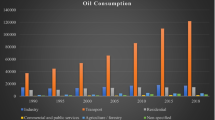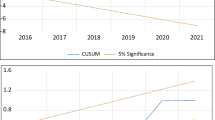Abstract
International trade and urbanization are increasing at an unprecedented rate in sub-Saharan Africa (SSA). The region has also witnessed a fair share of economic growth, with minimal investment and consumption of renewables. Therefore, this study investigates the influence of economic growth, international trade, and urbanization on CO2 emissions in SSA. The current study enriches the existing literature by employing the panel quantile regression analysis to account for existing levels of CO2 emissions in the region. Empirical findings reveal that GDP increases CO2 emissions across quantiles, especially in countries where the existing level of CO2 emissions is low. International trade improves environmental sustainability in countries where the existing levels of CO2 emissions are at their lowest and highest levels but exacts a reversed impact on CO2 emissions at the median. Further findings suggest that urbanization increases CO2 emissions across the observed quantiles with a more pronounced effect in countries where the existing levels of CO2 emissions are at its lowest level. The study also reveals a bi-directional causality between economic growth, international trade, urbanization, and the emissions of CO2. The limitations of the study and possible direction for future research have been highlighted. Policy directions are discussed.



Similar content being viewed by others
Data availability
Data for this study is available based on request.
References
Adedoyin FF, Nathaniel S, Adeleye N (2020) An investigation into the anthropogenic nexus among consumption of energy, tourism, and economic growth: do economic policy uncertainties matter? Environ Sci Pollut Res 28(3):2835–2847 1-13
Adusah-Poku F (2016) Carbon dioxide emissions, urbanization and population: empirical evidence from Sub-Saharan Africa. Energy Econ Lett 3(1):1–16
Agbugba I, Iheonu C, Onyeaka K (2018) Homogeneous and heterogeneous effect of exchange rate on economic growth in African countries. Int J Econ Commer Manag 6(9):1–14
Ahmed Z, Nathaniel SP, Shahbaz M (2021) The criticality of information and communication technology and human capital in environmental sustainability: Evidence from Latin American and Caribbean countries. J Clean Prod 286:125529
Ali R, Bakhsh K, Yasin MA (2019) Impact of urbanization on CO2 emissions in emerging economy: evidence from Pakistan. Sustain Cities Soc 48:101553
Andersson FN (2018) International trade and carbon emissions: the role of Chinese institutional and policy reforms. J Environ Manag 205:29–39
Appiah K, Du J, Musah AAI, Afriyie S (2017) Investigation of the relationship between economic growth and carbon dioxide (CO2) emissions as economic structure changes: evidence from Ghana. Resourc Environ 7(6):160–167
Asongu S, Nwachukwu J (2016) The role of governance in mobile phones for inclusive human development in sub-Saharan Africa. Technovation 55-56:1–13
Asongu S, Iheonu C, Odo K (2019) The conditional relationship between renewable energy and environmental quality in sub Saharan Africa. Environ Sci Pollut Res 26:36993–37000. https://doi.org/10.1007/s11356-019-06846-9
Aye GC, Edoja PE (2017) Effect of economic growth on CO2 emission in developing countries: evidence from a dynamic panel threshold model. Cogent Econ Finance 5(1):1379239
Baek J, Cho Y, Koo WW (2009) The environmental consequences of globalization: a country-specific time-series analysis. Ecol Econ 68(8-9):2255–2264
Baltagi BH, Kao C, Peng B (2016) Testing Cross-Sectional Correlation in Large Panel Data Models with Serial Correlation. Econometrics 4(4)
Bello MO, Solarin SA, Yen YY (2018) The impact of electricity consumption on CO2 emission, carbon footprint, water footprint and ecological footprint: the role of hydropower in an emerging economy. J Environ Manage 219:218–230
Boutabba MA (2014) The impact of financial development, income, energy and trade on carbon emissions: evidence from the Indian economy. Econ Model 40:33–41
Choi I (2001) Unit root tests for panel data. J Int Money Financ 20:249–272
Daly HE (1973) Towards a Steady State Economy. W.H. Freeman, San Francisco
Dogan E, Turkekul B (2016) CO2 emissions, real output, energy consumption, trade, urbanisation and financial development: testing the EKC hypothesis for the USA. Environ Sci Pollut Res 23(2):1203–1213
Dumitrescu E, Hurlin C (2012) Testing for Granger non-causality in heterogeneous panels. Econ Model 46(1):1450–1460
Ehrlich PR, Holdren JP (1971) Impact of Population Growth. Science 171(3977):1212–1217
Farhani S, Ozturk I (2015) Causal relationship between CO2 emissions, real GDP, energy consumption, financial development, trade openness, and urbanization in Tunisia. Environ Sci Pollut Res 22(20):15663–15676
Feng K, Davis SJ, Sun L, Hubacek K (2015) Drivers of the US CO2 Emissions 1997–2013. Nat Commun 6(1):1–8
Frees E (1995) Assessing cross-sectional correlation in panel data. J Econ 69:393–414
Friedman M (1937) The use of ranks to avoid the assumption of normality implicit in the analysis of variance. J Am Stat Assoc 32:675–701
Ghosh S (2010) Examining carbon emissions economic growth nexus for India: a multivariate cointegration approach. Energy Policy 38(6):3008–3014
Hossain MS (2011) Panel estimation for CO2 emissions, energy consumption, economic growth, trade openness and urbanization of newly industrialized countries. Energy Policy 39(11):6991–6999
Iheonu C, Nwachukwu T (2020) Macroeconomic deteminants of household consumption in selected West African countries. Econ Bull 40(2):1596–1606
Iheonu C, Agbutun S, Omenihu C, Ihedimma G, Osuagwu V (2019) The impact of governance quality on mortality rates in sub Saharan Africa. Afr Popul Stud 33(1):4655–4668
Im K, Pesaran M, Shin Y (2003) Testing for unit roots in heterogeneous panels. J Econ 115:53–74
Islam MR, Cheng Y, Rajib SU (2012) International trade and carbon emissions (CO2): the case of Bangaladesh. J Econ Sustain Dev 3(5):18–26
Jayanthakumaran K, Verma R, Liu Y (2012) CO2 emissions, energy consumption, trade and income: a comparative analysis of China and India. Energy Policy 42:450–460
Kao C (1999) Spurious regression and residual based tests for cointegration in panel data. J Econ 90:1–44
Karasoy A, Akçay S (2019) Effects of renewable energy consumption and trade on environmental pollution. Manag Environ Qual: An International Journal 721:137813
Kasperowicz R (2015) Economic growth and CO2 emissions: the ECM analysis. J Int Stud 8(3):91–98
Khan MK, Khan MI, Rehan M (2020) The relationship between energy consumption, economic growth and carbon dioxide emissions in Pakistan. Financial Innov 6(1):1–13
Khoshnevis Yazdi S, Dariani AG (2019) CO2 emissions, urbanisation and economic growth: evidence from Asian countries. Econ Res-Ekonomska Istraživanja 32(1):510–530
Liu X, Bae J (2018) Urbanization and industrialization impact of CO2 emissions in China. J Clean Prod 172:178–186
Maddala G, Wu S (1999) A comparative study of unit root tests with panel data and a new simple test. Oxf Bull Econ Stat 61(0):631–652
Marques AC, Fuinhas JA, Leal PA (2018) The impact of economic growth on CO2 emissions in Australia: the environmental Kuznets curve and the decoupling index. Environ Sci Pollut Res 25(27):27283–27296
McGee JA, York R (2018) Asymmetric relationship of urbanization and CO2 emissions in less developed countries. PLoS One 13(12):e0208388
Mikayilov JI, Galeotti M, Hasanov FJ (2018) The impact of economic growth on CO2 emissions in Azerbaijan. J Clean Prod 197:1558–1572
Mitić P, Munitlak Ivanović O, Zdravković A (2017) A cointegration analysis of real GDP and CO2 emissions in transitional countries. Sustainability 9(4):568
Nathaniel SP (2019) Modelling urbanization, trade flow, economic growth and energy consumption with regards to the environment in Nigeria. GeoJournal 85:1499–1513 1-15
Nathaniel SP, Adeleye N (2020) Environmental preservation amidst carbon emissions, energy consumption, and urbanization in selected African countries: implication for sustainability. J Clean Prod 285:125409
Nathaniel S, Iheonu C (2019) Carbon dioxide abatement in Africa: the role of renewable and non-renewable energy consumption. Sci Total Environ 679:337–345
Nathaniel S, Khan SAR (2020) The nexus between urbanization, renewable energy, trade, and ecological footprint in ASEAN countries. J Clean Prod 272:122709
Nathaniel SP, Adeleye N, Adedoyin FF (2020a) Natural resource abundance, renewable energy, and ecological footprint linkage in MENA countries. Stud Appl Econ 39(2) . https://doi.org/10.25115/eea.v39i2.3927
Nathaniel SP, Nwulu N, Bekun F (2020b) Natural resource, globalization, urbanization, human capital, and environmental degradation in Latin American and Caribbean countries. Environ Sci Pollut Res 28:6207–6221 1-15
Nathaniel SP, Yalçiner K, Bekun F (2020c) Assessing the environmental sustainability corridor: linking natural resources, renewable energy, human capital, and ecological footprint in BRICS. Resource Policy. https://doi.org/10.1016/j.resourpol.2020.101924
Nathaniel S, Aguegboh E, Iheonu C, Sharma G, Shah M (2020d) Energy consumption, FDI, and urbanization linkage in coastal Mediterranean countries: re-assessing the pollution haven hypothesis. Environ Sci Pollut Res 27(28):35474–35487
Nathaniel S, Anyanwu O, Shah M (2020e) Renewable energy, urbanization, and ecological footprint in the Middle East and North Africa region. Environ Sci Pollut Res 27:14601–14613 1-13
Nathaniel S, Barua S, Hussain H, Adeleye N (2020f) The determinants and interrelationship of carbon emissions and economic growth in African economies: Fresh insights from static and dynamic models. J Public Affairs e2141. https://doi.org/10.1002/pa.2141
Omojolaibi J, Nathaniel S (2020). Assessing the potency of environmental regulation in maintaining environmental sustainability in MENA countries: An advanced panel data estimation. J Public Affairs e2526. https://doi.org/10.1002/pa.2526
Omri A, Daly S, Rault C, Chaibi A (2015) Financial development, environmental quality, trade and economic growth: what causes what in MENA countries. Energy Econ 48:242–252
Pedroni P (1999) Critical values for cointegration tests in heterogeneous panels with multiple regressors. Oxf Bull Econ Stat 61(S1):653–670
Pesaran M (2004) General diagnostic tests for cross section dependence in panels. University of Cambridge, Faculty of Economics Working Paper 0435. Retrieved from http://www.econ.cam.ac.uk/research-files/repec/cam/pdf/cwpe0435.pdf
Ren S, Yuan B, Ma X, Chen X (2014) The impact of international trade on China′’ s industrial carbon emissions since its entry into WTO. Energy Policy 69:624–634
Salahuddin M, Gow J, Ali MI, Hossain MR, Al-Azami KS, Akbar D, Gedikli A (2019) Urbanization-globalization-CO2 emissions nexus revisited: empirical evidence from South Africa. Heliyon 5(6):e01974
Sarwar S, Alsaggaf MI (2019) Role of urbanization and urban income in carbon emissions: regional analysis of China. Appl Ecol Environ Res 17(5):10303–10311
Serdeczny O, Adams S, Baarscgi F, Coumou D, Robinson A, Hare W, Schaeffer M, Perrette M, Reinhardt J (2016) Climate change impacts in sub-Saharan Africa: from physical changes to their social repercussions. Reg Environ Chang 17:1585–1600
Shahbaz M, Hye QMA, Tiwari AK, Leitão NC (2013) Economic growth, energy consumption, financial development, international trade and CO2 emissions in Indonesia. Renew Sust Energ Rev 25:109–121
Shahbaz M, Nasreen S, Ahmed K, Hammoudeh S (2017) Trade openness–carbon emissions nexus: the importance of turning points of trade openness for country panels. Energy Econ 61:221–232
Shobande O (2020) The effect of energy use on infant mortality rates in Africa. Environ Sustain Indic 5:100015
Ssali MW, Dui J, Mensah IA, Hongo DO (2019) Investigating the nexus among environmental pollution, economic growth, energy use and foreign direct investment in 6 selected sub-Saharan African countries. Environ Sci Pollut Res 26:11245–11260
Wang P, Wu W, Zhu B, Wei Y (2013) Examining the impact factors of energy-related CO2 emissions using the STIRPAT model in Guangdong Province, China. Appl Energy 106:65–71
Westerlund J (2007) Testing for error correction in panel data. Oxf Bull Econ Stat 69(6):709–748
World Bank (2020) World Development Indicators. World Bank, Washington DC
York R, Rosa EA, Dietz T (2003) STIRPAT, IPAT and ImPACT: analytic tools for unpacking the driving forces of environmental impacts. Ecol Econ 46(3):351–365
Zhang S, Liu X, Bae J (2017) Does trade openness affect CO 2 emissions: evidence from ten newly industrialized countries? Environ Sci Pollut Res 24(21):17616–17625
Author information
Authors and Affiliations
Contributions
Chimere Iheonu formal analysis and discussion of results. Ogochukwu Anyanwu wrote the introduction. Kingsley Odo reviewed the required literature. Solomon Nathaniel wrote the methodology and provided relevant policy recommendations.
Corresponding author
Ethics declarations
Ethics approval and consent to participate
Not applicable
Consent for publication
Not applicable
Competing interests
The authors declare no competing interests.
Additional information
Responsible Editor: Nicholas Apergis
Publisher’s note
Springer Nature remains neutral with regard to jurisdictional claims in published maps and institutional affiliations.
Appendices
Appendices
Annex 1:
Lists of countries
Benin, Botswana, Burkina Faso, Burundi, Cabo Verde, Cameroon, Central African Republic, Chad, Comoros, Congo, Cote d’Ivoire, Eswatini, Gabon, Gambia, Ghana, Guinea, Guinea-Bissau, Kenya, Madagascar, Malawi, Mali, Mauritania, Mauritius, Nigeria, Rwanda, Senegal, Seychelles, Sierra Leone, South Africa, Sudan, Tanzania, Togo, Uganda, Zimbabwe.
Rights and permissions
About this article
Cite this article
Iheonu, C.O., Anyanwu, O.C., Odo, O.K. et al. Does economic growth, international trade, and urbanization uphold environmental sustainability in sub-Saharan Africa? Insights from quantile and causality procedures. Environ Sci Pollut Res 28, 28222–28233 (2021). https://doi.org/10.1007/s11356-021-12539-z
Received:
Accepted:
Published:
Issue Date:
DOI: https://doi.org/10.1007/s11356-021-12539-z




